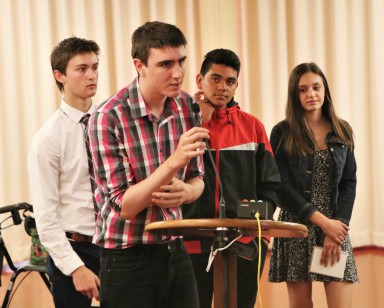San Rafael, CA – After a frank public discussion about how racism framed housing policies both locally and across the nation, the Marin County Board of Supervisors asked County of Marin staff to schedule a public workshop in September to explore enhanced code enforcement, an ordinance to require just cause for evictions, and ways to obtain better data on local rental trends.
 Vaughan Logan of Marin Academy speaks to the Board of Supervisors with other members of the Marin County Youth Commission's Housing Comittee on June 12..
Vaughan Logan of Marin Academy speaks to the Board of Supervisors with other members of the Marin County Youth Commission's Housing Comittee on June 12..No Board vote took place at a June 12 evening meeting that lasted just under 2 ½ hours, but the Marin County
Community Development Agency’s (CDA) housing program said it will return for a follow-up session about ways to better assure fair housing for all. All five Supervisors individually supported the move for a September workshop after hearing feedback from about 25 speakers and a presentation from the Marin County Youth Commission’s Housing Committee.
“We are facing a crisis together in housing that’s Bay Area-wide and certainly right here in Marin,” Board President Damon Connolly said. “It’s no accident that I think we (Supervisors) all list housing as our top issue. … Most particularly it’s helpful to see the historic context of what we’re speaking about, how barriers (to fair housing) were created, and the understanding that in order to ultimately achieve a more just society we have to continue to work to overcome those barriers.”
Most community members spoke in favor of a just-cause ordinance. Just cause for eviction means the landlord must demonstrate that an eviction or lease termination is permittable, such as non-payment or habitual lateness of rent, creating a nuisance, demolishing property or other breaches of a rental agreement.
Marin County is one of the most expensive places to live in the United States, and the lack of affordable housing choices has been labeled as a local crisis. In its presentation, the CDA staff illustrated how institutionalized racism dating back decades shaped neighborhoods in Marin and excluded people of color from purchasing homes. The Federal Housing Administration’s underwriting manual from 1936 said it was necessary that properties should be occupied by people of the same social and racial classes to “retain stability” and prevent “a reduction in values.” In a process called redlining, neighborhoods mapped in red showed where people of color were allowed to live and where they were not.
Staff stated how patterns of segregation continue to exist today even though the laws have changed. Redlined zones on maps from the 1940s show the same areas that were denied economic opportunities continue to be concentrated areas of poverty today.
More than 1,400 Marin residents were contacted over 20 months about fair housing, and most were from communities directly impacted by barriers to housing choice. CDA staff created a community advisory group and a steering committee to help assess the feedback and develop recommendations to the County. The groups’ top recommendations were to present a Board proposal for a just-cause eviction ordinance sometime in 2018, support a housing oversight committee to help identify solutions to local affordable housing crisis, and continue with a robust community engagement process. The advisory group and steering committee became familiar with fair housing laws and the effects of racism and gentrification in African-American and other communities of color, and shared personal insights with CDA staff.
Very few multifamily housing developments are being proposed and built in Marin because local zoning is primarily for single-family detached homes. The median price of a single-family home in Marin is about $1.1 million, and the average monthly rent for a two-bedroom apartment is more than $3,100. For those reasons and others, the County encourages the development of accessory dwelling units (commonly called second units), junior accessory dwelling units, and room rentals as one strategy of addressing the ongoing housing crisis.
In addition to source-of-income protections, the County prohibits unfair housing practices in the rental, sale, or financing of housing because of a person's race, color, national origin, ancestry, disability, gender, parental status, marital status, religion, sexual orientation, and age.
Learn more on the County’s fair housing webpage or through the Marin Housing Authority.